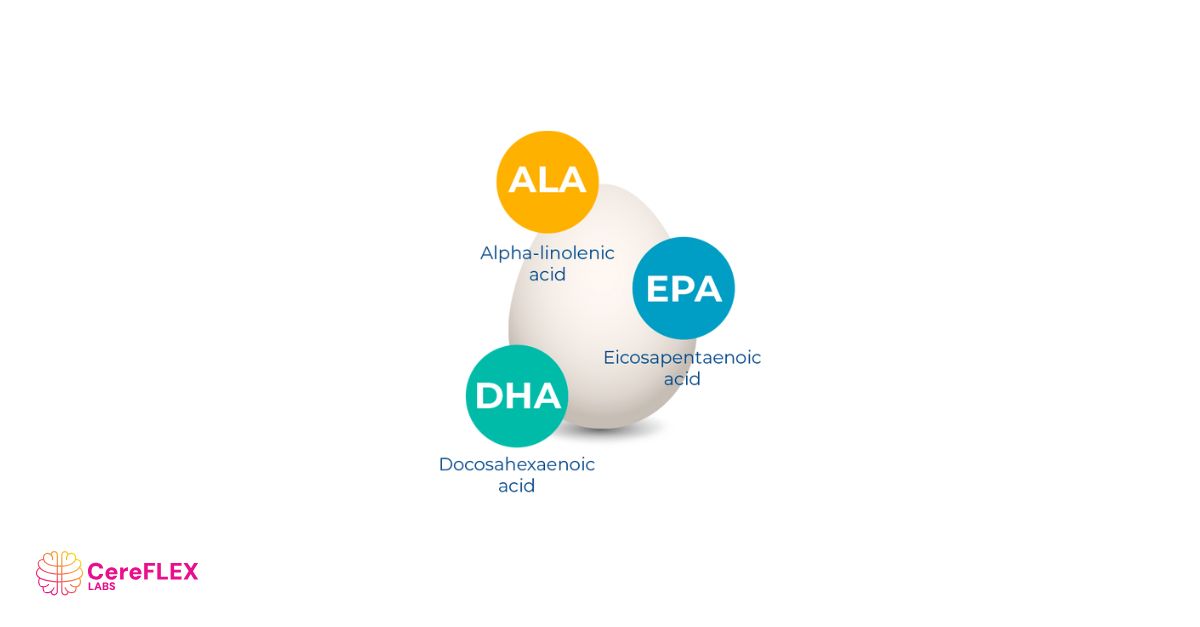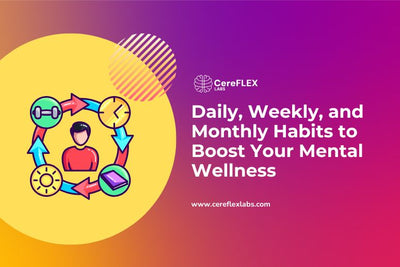Omega-3 fatty acids, especially EPA and DHA, play a vital role in maintaining brain health at every stage of life. These essential fats support nervous system development, cognitive performance, mood regulation, and protection against age-related decline.
Omega-3s are key building blocks of brain cells, helping to improve cell communication and reduce inflammation—factors closely linked to memory, focus, and overall brain function.
Research consistently shows that a higher intake of omega-3s is associated with better cognitive outcomes, from childhood through older adulthood. Understanding how these nutrients work—and where to find them in foods or supplements—is an important step in supporting long-term brain health.

What are Omega-3 fatty acids?
Omega-3 fatty acids are healthy fats that your body cannot produce on its own, making it essential to get them through food or supplements.
These fats are critical to every cell in the body. They provide energy and support the health of your heart, lungs, blood vessels, immune system, and—most importantly—your brain.

Types of Omega-3s
There are three main types of omega-3 fatty acids:
Alpha-Linolenic Acid (ALA)
ALA is the most common omega-3 found in plant-based foods. While your body can convert small amounts of ALA into EPA and DHA, this process is inefficient. Rich sources of ALA include flaxseeds, flaxseed oil, chia seeds, walnuts, hemp seeds, soybeans, and canola oil.
Eicosapentaenoic Acid (EPA)
EPA is primarily found in fatty fish and fish oil. It supports heart health, reduces inflammation, and plays a role in mood regulation. Some microalgae also contain EPA, making it accessible for vegetarians and vegans.
Docosahexaenoic Acid (DHA)
DHA is the most critical omega-3 for brain structure and cognitive function. It is highly concentrated in brain cells and the retina of your eyes. DHA is abundant in fatty fish, fish oil, and algae-based supplements, making it essential for both omnivores and plant-based eaters.
In the context of brain health, DHA supports the physical structure and signalling of brain cells, while EPA is more involved in managing inflammation and emotional balance. Together, they provide comprehensive support for brain function at every stage of life.
How Omega-3s Work in the Brain
Omega-3 fatty acids, especially DHA and EPA, play a vital role in maintaining the brain’s structure and function. They enhance communication between brain cells and help the brain adapt to stress, aging, and environmental challenges.
Cell Membrane Fluidity
DHA and EPA are key components of brain cell membranes, giving them flexibility and improving how cells communicate. Their unique structures prevent membranes from becoming rigid, which helps brain cells function more efficiently—especially under physical or environmental stress.
Research shows that membranes rich in EPA and DHA promote better energy production and cellular resilience. In the human brain, this translates to faster signalling and enhanced neurotransmission, supporting mental clarity, memory, and cognitive performance.1
Neurotransmission and Neuroplasticity
Omega-3s not only improve neurotransmission but also support neuroplasticity—the brain’s ability to adapt and form new connections. This is crucial for learning, memory retention, and emotional resilience.
They also influence the production of mood-regulating chemicals like serotonin and dopamine, which may help reduce symptoms of depression and support mental well-being.
Anti-Inflammatory and Antioxidant Effects
EPA is especially known for its anti-inflammatory properties, helping to reduce chronic brain inflammation that can contribute to cognitive decline, depression, and neurodegenerative diseases. Omega-3s also protect brain cells from oxidative stress, supporting long-term brain health.
Impact on Brain Structures
Higher omega-3 levels have been linked to larger volumes in key brain areas like the hippocampus (responsible for memory) and the prefrontal cortex (important for decision-making and attention). These regions are particularly vulnerable to aging, and omega-3s may help preserve their function over time.
How do omega-3 fatty acids benefit brain health?
Omega-3s have been widely studied for their role in supporting memory, focus, emotional well-being, and brain health throughout life. Their benefits extend from improving mild cognitive challenges to supporting mental health conditions.

Help Mild Memory Loss
Omega-3 fatty acids are especially important for older adults experiencing age-related memory issues or mild cognitive impairment (MCI). While research shows limited benefit for severe conditions like Alzheimer’s disease, some studies suggest that omega-3 supplements—particularly DHA—may help slow memory decline in its early stages.
For example, a study of 485 older adults with MCI found that those who took 900 mg of DHA daily for 24 weeks performed better on memory and learning tasks compared to a placebo group.2
Improve Mental Health Disorders
Low levels of omega-3s have been observed in individuals with various mental health conditions, including schizophrenia and bipolar disorder. While research is ongoing and mixed, some evidence suggests that omega-3 supplements may support emotional balance and reduce aggressive behaviour in certain populations.

Reduce Depression and Anxiety Symptoms
Omega-3s, particularly EPA, have been shown to support mood regulation and reduce symptoms of depression and anxiety. People who eat omega-3s regularly are less likely to experience these conditions.
Studies also suggest that omega-3 supplements can help improve symptoms of depression and anxiety. Among the three types of omega-3 fatty acids, EPA seems to be the most helpful for managing depression.3
Alleviate Symptoms of ADHD in Children
Children with attention deficit hyperactivity disorder (ADHD) often have lower levels of omega-3s. Some research suggests that omega-3 supplements may improve attention, reduce hyperactivity, and support emotional regulation in children with ADHD. However, findings are mixed, and more research is needed to confirm these benefits.3
Why Omega-3s Matter for Growing Brains
Omega-3 fatty acids are essential for healthy brain development in infants and young children. Getting enough omega-3s during pregnancy has been linked to several developmental benefits, including improved thinking skills, better communication and social abilities, fewer behavioural challenges, and a lower risk of developmental delays.
These fatty acids are key building blocks in brain cell membranes, helping to improve communication between cells and maintain brain health throughout life.
Parents and caregivers play a vital role in ensuring children get enough omega-3s. Foods like oily fish, eggs, and fortified products are excellent sources. For families following vegetarian or vegan diets, plant-based supplements made from algae provide a way to supply DHA and EPA directly, without relying on the body’s limited ability to convert ALA.
Choosing the right sources of omega-3s early in life helps set the foundation for cognitive, emotional, and social development that carries into adulthood.
Top Omega-3 Sources: Marine and Plant-Based Options
Getting enough omega-3s through food is one of the best ways to support long-term brain health. Both marine and plant-based sources offer benefits, but they differ significantly in type and bioavailability.

Marine Sources (EPA & DHA – Highly Bioavailable)
Marine foods are the richest sources of EPA and DHA, the forms of omega-3 that your body can use most effectively for brain, heart, and eye health.
- Mackerel: About 4,580 mg of omega-3s per 100g. Also high in B12 and selenium.
- Caviar: Roughly 6,540 mg per 100g, though typically eaten in small portions.
- Cod Liver Oil: Around 2,438 mg per tablespoon, along with high levels of vitamins A and D.
- Salmon: About 2,150 mg per 100g, widely accessible and nutrient-dense.
- Herring: Roughly 2,150 mg per 100g, often eaten smoked or pickled.
- Sardines: Between 982 and 1,463 mg per 100g, plus calcium and vitamin D.
- Anchovies: About 2,053 mg per 100g, small but nutrient-dense.
- Oysters: Lower in omega-3s (329–391 mg per 100g) but rich in zinc and B12.

Plant-Based Sources (ALA – Requires Conversion to EPA/DHA)
While plant-based foods offer omega-3s in the form of ALA, your body converts only a small percentage of ALA into EPA and DHA.
- Chia Seeds: About 5,050 mg of ALA per 28g (1 oz), also high in fibre and minerals.
- Flaxseed Oil: Around 7,260 mg of ALA per tablespoon. Best used raw.
- Whole Flaxseeds: About 2,350 mg of ALA per tablespoon. Grind before eating for better absorption.
- Walnuts: Roughly 2,570 mg of ALA per ounce, plus antioxidants.
- Soybeans: Between 670 and 1,440 mg of ALA per 100g, depending on preparation.
- Hemp Seeds: About 2,600 mg of ALA per 3 tablespoons, with a balanced omega-3 to omega-6 ratio.
Other Omega-3-Containing Foods
These foods contribute smaller amounts of omega-3s but are easy to include in a balanced diet:
- Omega-3-enriched or pasture-raised eggs
- Grass-fed meats and dairy
- Leafy greens and vegetables
Bioavailability: Marine vs. Plant Sources
Marine sources provide EPA and DHA directly, making them more effective for raising omega-3 levels in the body. In contrast, plant-based sources require conversion from ALA, a process that is typically less than 10% efficient.
For those following vegetarian or vegan diets, algae oil supplements offer a plant-based way to get pre-formed EPA and DHA, bypassing the need for conversion.
Potential Risks and Considerations When Using Omega-3s
Omega-3s are generally safe when consumed through food, but there are some important considerations when taking high-dose supplements or combining them with certain medications.
Possible Side Effects of High-Dose Omega-3s
Taking more than 3 grams per day of omega-3 supplements may lead to mild side effects for some people, such as:
- Upset stomach or nausea
- Fishy aftertaste or burps
- Loose stools
- Increased risk of bleeding
Most people tolerate recommended doses well, but exceeding safe limits can disrupt the balance of fats in the body and may increase the risk of side effects.
Medication Interactions to Consider
Omega-3s, particularly EPA, have mild blood-thinning effects. If you are taking blood thinners like aspirin or warfarin, or medications for blood pressure or inflammation, consult your healthcare provider before starting omega-3 supplements.
Professional advice is especially important if you have ongoing health conditions or are considering high-dose fish oil or other omega-3 products. A healthcare provider can help you determine the safest and most effective dosage for your needs.
Conclusion: Omega-3s for Lifelong Brain Health
Omega-3 fatty acids, especially EPA and DHA, are essential for maintaining memory, focus, mood, and cognitive health throughout life. From supporting early brain development to protecting against age-related decline, their benefits are backed by scientific research and real-world experience.
While a balanced diet rich in fatty fish, seeds, and plant oils provides the foundation, supplements can help fill the gap for those who don’t consume enough omega-3s through food. Choosing the right dosage and form—whether fish oil or plant-based options—can make a meaningful difference in long-term brain health.
For targeted cognitive support, CereFlex Labs’ AM/PM Brain Protocol offers a daily solution designed to work with your body’s natural rhythm:
- AM Formula: Supports mental energy, clarity, and focus throughout the day.
- PM Formula: Promotes relaxation and helps you unwind while supporting mental balance at night.
Built on evidence-based ingredients, CereFlex provides an easy way to support your brain health—day and night.






